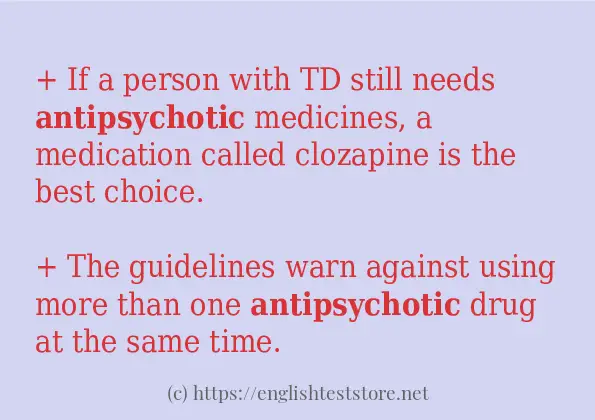How to use in-sentence of “antipsychotic”:
+ If a person with TD still needs antipsychotic medicines, a medication called clozapine is the best choice.
+ The guidelines warn against using more than one antipsychotic drug at the same time.
+ This happens more often with older antipsychotic medicines.
+ She would purposefully get herself arrested so that she would be given antipsychotic medication.
+ The longer a person has been on antipsychotic medicines, the more likely they are to get TD.
+ Some reviews of research sponsored by the makers of antipsychotic drugs claim that about 40 to 50 percent of people have a good response to medication, 30 to 40 percent have a partial response, and 20 percent have an unsatisfactory response.
+ There are certain antipsychotic drugs and therapies that can help treat the symptoms.
+ Chlorpromazine is an antipsychotic drug.

Example sentences of “antipsychotic”:
+ Tardive dyskinesia is usually caused by taking antipsychotic medicines in high doses, or for a long time.
+ Today, antipsychotic drugs, like chlorpromazine, may treat the symptoms of such disorders.
+ They can get TD even after taking an antipsychotic medicine just once.
+ Most of the asylums were closed in the late 1900s because of the invention of antipsychotic medicines.
+ Originally, antipsychotic medications were used to treat mental disorders like depression, bipolar disorder or schizophrenia.
+ The guidelines also warn against using more than one antipsychotic drug at the same time.
+ The first-line psychiatric treatment for schizophrenia is antipsychotic medication, Many antipsychotics are Dopamine antagonists High concentrations of Dopamine are thought to be the cause of hallucinations and delusions.
+ Doctors usually treat mania with a combination of mood stabilizers and antipsychotic medicines.
+ Newer antipsychotic medicines are less likely to cause tardive dyskinesia, but they still can.
+ Nobody knows why some people get tardive dyskinesia after taking antipsychotic medicines while others do not.
+ This study included 22 428 patients and 11 antipsychotic drugs.
+ Most people who get tardive dyskinesia are people who have schizophrenia, schizoaffective disorder, or bipolar disorder, and have been on antipsychotic medicines for a long time.
+ Substances that help to reduce symptoms of autism are the antipsychotic drugs.
+ Tardive dyskinesia is usually caused by taking antipsychotic medicines in high doses, or for a long time.
+ Today, antipsychotic drugs, like chlorpromazine, may treat the symptoms of such disorders.
+ They can get TD even after taking an antipsychotic medicine just once.
